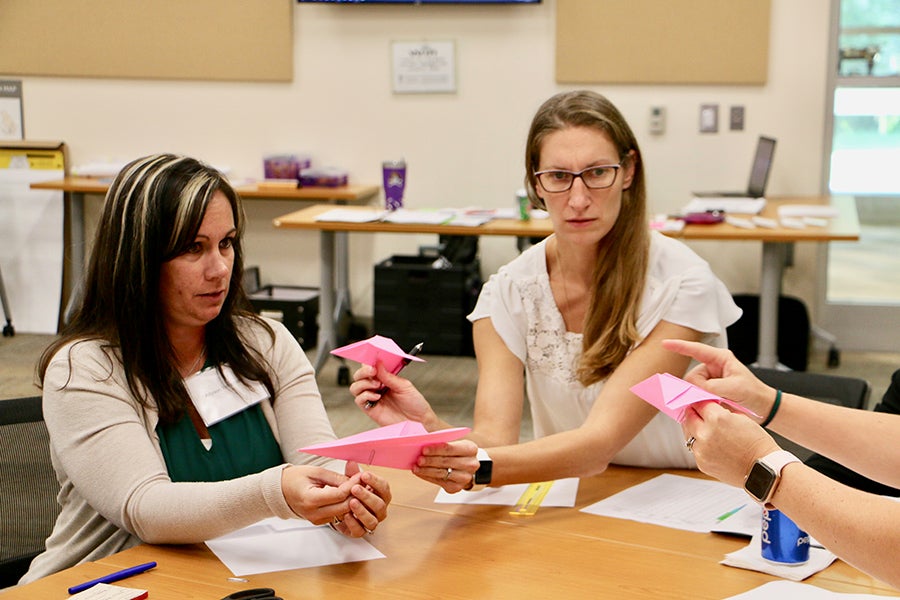TEACHERS OF QUALITY
ECU’s innovative approach to improving quality in health care delivery begins fourth iteration
The Brody School of Medicine’s innovative Teachers of Quality Academy (TQA) – which trains healthcare professionals to improve quality in health care delivery – recently welcomed its fourth cohort.

Teachers of Quality Academy participants get their first lesson in quality and teamwork through a paper airplane challenge.
The program began in 2014 after the East Carolina University medical school was one of only 11 nationwide – 80 percent of U.S. medical schools applied – to be awarded a five-year, $1 million grant through the American Medical Association’s Accelerating Change in Medical Education initiative. The AMA program aims to bridge the gap between how future physicians are trained and how health care is delivered.
The Teachers of Quality Academy addresses that mission by providing faculty and clinical leaders advanced training in health system science competencies and how to apply skills across the health system through the development of clinical improvement projects.
Dr. Tim Reeder, executive vice chair for Brody’s Department of Emergency Medicine and director of the TQA program, said the ultimate goal of TQA is to train health professional to become the clinical leaders and educators of the future, and to create a community of like-minded individuals who can share their stories about quality, safety and leadership.
“In TQA, what we’re really trying to do is to teach that content, especially quality, over a spectrum of interprofessional groups and in a clinical environment. Because we know that we learn best what we do,” Reeder explained during a TQA event at Eastern Area Health Education Center (AHEC) in Greenville on Sept. 26.
Since 2014, the Teachers of Quality Academy has graduated 78 health care professionals from four ECU schools and colleges, 17 different departments and throughout Vidant Health. In that time, the program produced 64 quality improvement initiatives, 27 curricular developments and more than 20 of the graduates have been promoted to leadership roles.
This year’s TQA cohort of 38 participants from ECU and Vidant Health is the largest in the program’s history, Reeder said, tying the previous mark set by the inaugural cohort.
Erika Taylor is a medical family therapist at ECU’s Family Medicine Center, but also provides behavioral health services to Vidant’s Belhaven and Chocowinity clinics and works with the Duplin County school system. These wide-ranging duties were what Taylor said inspired her to take part in the Teachers of Quality Academy.
“I represent a lot of different facets of our patient population, so I’m really excited to learn about ways to integrate systemic changes into our leadership protocols and the ways in which we’re providing patient care,” she said.
Dr. James deVente, an associate professor in ECU’s Department of Obstetrics and Gynecology, also offered a lofty goal as his reason to take part in the program.
“My goal is to make eastern North Carolina a better place to be born,” he said. “And I’m hoping find ways to do that more efficiently and effectively.”

ECU’s Rhonda Stickland, left, and Vidant Health’s Clyde Brooks listen while Dr. Jennifer Sutter, from the Brody School of Medicine’s Division of Pediatric Endocrinology, speaks during a Teachers of Quality Academy event on Sept. 26.
Dr. Jason Foltz, chief medical officer of ECU Physicians, took part in the first cohort to further his knowledge about quality improvement science and process. Foltz’s involvement with TQA did not end with his completion of the program, as he has stayed on as a small group coach.
“It’s an investment in time that pays off professionally by making you a better professional, team member and patient partner,” said Foltz, adding the historic program has already had tremendous benefits for patients by creating a group of faculty and staff focused on continuous quality improvement.
“This culture of inquiry has led to numerous improvements in health outcomes, workflow efficiencies, interprofessional education and collaboration between the Brody School of Medicine and Vidant Health,” he added. “Long term, our patients will see continued improvements in process and adoption of state-of-the-art pathways across the health system. Our clinicians will be better prepared for success as our national health system shifts to a focus on value.”
Jenna Garris, executive director of Brody’s Redesigning Education to Accelerate Change in Healthcare (REACH) initiative, which oversees the TQA program, said that the AMA grant funding ended in September 2018, but ECU and Vidant Health agreed to provide the funding needed for it to continue.
“Quality improvement is a continuous effort. We can never stop improving our system of delivery to provide safe, high-quality care to our patients,” Garris said. “Our vision is to create a culture where learners, educators, health care practitioners, administrators and leaders view the world through a quality lens. This will not only improve the quality of care, but quality of life in eastern North Carolina.”
